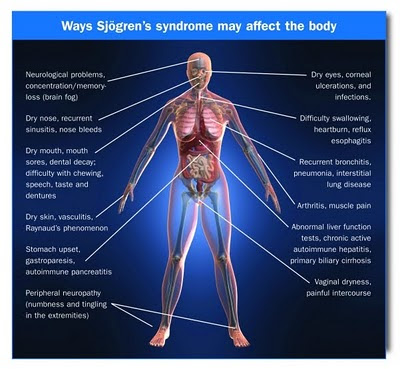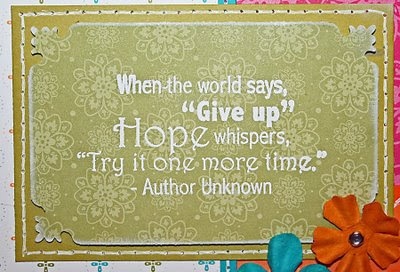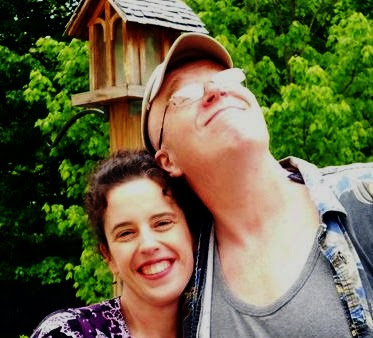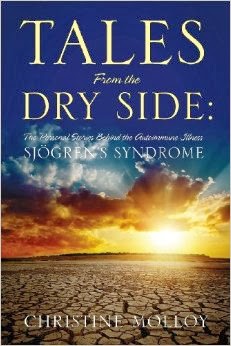 Although I talk a lot on this blog about my experiences with an autoimmune disorder called Sjogren’s Syndrome, I have dealt with and currently still deal with a multitude of other medical diagnoses. It would appear that when it came to the luck of the draw in the God designing Christine department, I got the short end of the stick. I was not a particularly sickly child, but once I entered my early twenties, it seemed like every few years a new medical problem reared its ugly head. I am not talking about common stuff either. Oh no, I got the wacky and unusual stuff….Hodgkin’s Disease (which is a lymphoma), AV Nodal Reentry Tachycardia (a defect in my heart’s conduction which required surgery), Factor V Leiden (a genetic blood clotting disorder), and of course the Sjogren’s Syndrome. Throw in some more common diagnoses like Hypothyroidism, Polycystic Ovarian Syndrome, etc. and you have a nice array of specialists that I have to deal with on a regular basis.
Although I talk a lot on this blog about my experiences with an autoimmune disorder called Sjogren’s Syndrome, I have dealt with and currently still deal with a multitude of other medical diagnoses. It would appear that when it came to the luck of the draw in the God designing Christine department, I got the short end of the stick. I was not a particularly sickly child, but once I entered my early twenties, it seemed like every few years a new medical problem reared its ugly head. I am not talking about common stuff either. Oh no, I got the wacky and unusual stuff….Hodgkin’s Disease (which is a lymphoma), AV Nodal Reentry Tachycardia (a defect in my heart’s conduction which required surgery), Factor V Leiden (a genetic blood clotting disorder), and of course the Sjogren’s Syndrome. Throw in some more common diagnoses like Hypothyroidism, Polycystic Ovarian Syndrome, etc. and you have a nice array of specialists that I have to deal with on a regular basis.There is a point to mentioning all this though. Because of this ridiculous amount of exposure to the health care system as a patient and most significantly because of the challenges I have faced in dealing with doctors regarding the Sjogren’s, I have a very (and I mean VERY) low tolerance now for inadequate and impersonal medical care. As a nurse, I have always been a strong advocate for my patients; at times, even getting myself into a little hot water because I challenged my patient’s doctors when I felt that they were not being attentive or appropriate in their care of my patients. However as a patient, I was not always good at this. I got intimidated easily by my own doctors and always trusted that they knew what was best for me.
Over the past few years this has changed dramatically because, as I mentioned earlier, I struggled so desperately to get the Sjogren’s diagnosis. Heck, I struggled to even get someone to believe there was something wrong with me. And in the end, I listened to my own inner voice. I was relentless in my quest and I finally got an answer.
About a month ago, I woke up with severe abdominal pain that had started a few weeks previous to that day but I had chalked it up to problems with my menstrual cycle. On this day though, I felt that something was really wrong. I called my gynecologist who despite his somewhat impersonal manner, had never done wrong by me. By the time I saw him, I was doubled over in pain. After examining me, he decided I needed an ultrasound which could not be done until the next day. He would not give me anything for pain and said that Tylenol or Motrin should help. It did not.
The day after the ultrasound, I called the office as I was still in some of the worst pain of my life (which is saying a lot!) and I was looking for my ultrasound results. I was told by the nurse that there was small cyst on my ovary that would not be causing me this degree of pain and I needed to follow up with my primary doctor. And of course it was a Friday. I told her that I thought it was gynecological related and as I had issues similar to this previously, but just not as severe. Nope, I still got passed off to another doctor. At this point, I have been in severe pain for forty-eight hours and wished I was dead. My primary doctor was not in the office that day and I decided to go to the emergency room.
The end result of this trip to the emergency room was that I was dehydrated and a CT Scan showed that not only did I have a cyst on one ovary, but I also had a ruptured one on the other ovary therefore validating the high amount of pain I was in. I was told that it would take at least a few days until the pain would subside and they gave me pain medication to get me through the pain and told me to follow-up with my doctor in three days.
I never did go back to my gynecologist. I followed up instead with my primary care who I felt had enough knowledge to see me through the rest of this crisis. See because the problem was, I no longer trusted my gynecologist for many reasons. He knew me well enough to know that I would never be doubled over in pain unless something was really wrong. He did not adequately address my pain issues. He left me like that for over two days and then when I sought his help again, he dumped me on someone else when it was a gynecological problem all along.
I can’t let something like this go. There have been a few rare instances in the past few years where I have disagreed with the way one of my doctors has handled something and after having a discussion about it, it was resolved. But when I looked back to all my interactions with my gynecologist, I realized he sucked as a doctor. My visits were always rushed. I always felt like I was bothering him when I had questions about my treatment. He never seemed to want to address the fact that I have a mother with a history of both ovarian and breast cancer; therefore putting me in a high risk category. He didn’t take time to do any teaching with me. He knew very little about how significantly my other medical diagnoses were affecting my life. He just didn’t seem to care.
I don’t need each of my doctors to hold my hand and be my friend. But I DO need them to treat me as a person; a person who has been through a hell of a lot medically. I deserve to be informed. I deserve for them to be accountable. I am very well aware of how difficult it is for doctors to practice with all the insurance regulations and productivity requirements. But you know what? There are doctors out there who DO listen to their patients. I know because some of them are my doctors. Never in a million years would my endocrinologist let me leave her office in the kind of pain I was in that day without doing something further.
So what am I to do? What are we to do as health care consumers? We need to stand up and make ourselves heard. We need to tell those that hold our very lives in their hands that we deserve the very best that healthcare has to offer. How do we do this? We screen our doctors before we become their patients. We go to our appointments organized with a medication list and a list of our questions and concerns. We take control of our own health by learning about our various conditions and then committing ourselves to truly getting better, even if it means changing bad lifelong habits. We listen to our instincts when we feel something is wrong with our bodies. We don’t let doctors rush us through office appointments or procedures. When we feel that we are not getting what we need from our providers, we look elsewhere. And we keep looking until we find what we need and what we deserve.
The outcome of my little doctor fiasco was that I immediately started looking for a new doctor. I know there is a stigma attached to patients who “doctor shop” and you know what? I don’t care. You shouldn’t either. It is your body, your life. I am not saying that if issues arise, but yet you trust/like your doctor, that you shouldn’t try to work it out. You should. But don’t let things go. I have been wrong a few times thinking I knew more than my doctor but a good doctor will respect that. It took me changing doctors twice to finally get an accurate cancer diagnosis with the Hodgkin’s disease and five rheumatologists to not only get the Sjogren’s diagnosis, but also to treat it properly. In both instances I am glad that I did not just sit there and trust that the doctor knew best.
I saw my new provider for the first time today for a procedure. She spent quality time with me trying to make sure she had a good history. She asked about my Sjogren’s, how I got diagnosed, and how it has affected my life. She did some teaching with me about not only the procedure but about the possible implications of the results. She was patient. She validated my very appropriate anxiety. She treated me like a person and not just one of her many afternoon appointments.
She knew what she was doing.
She cared.
It was exactly what I was looking for.
Photos :Courtesy of Google Images







